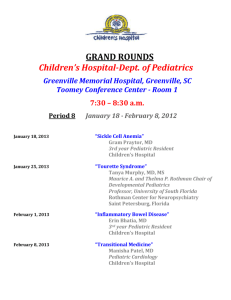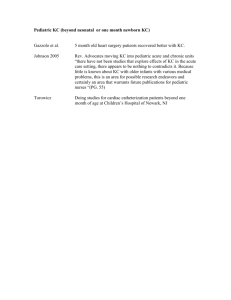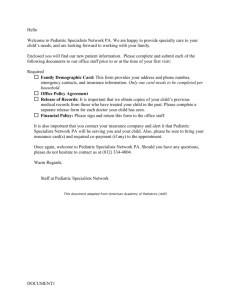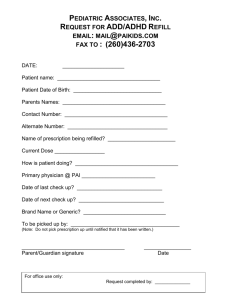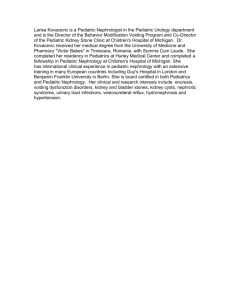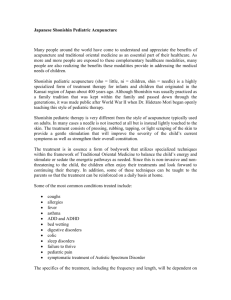THE PEDIATRIC MEDICAL HOME - Armstrong State University
advertisement
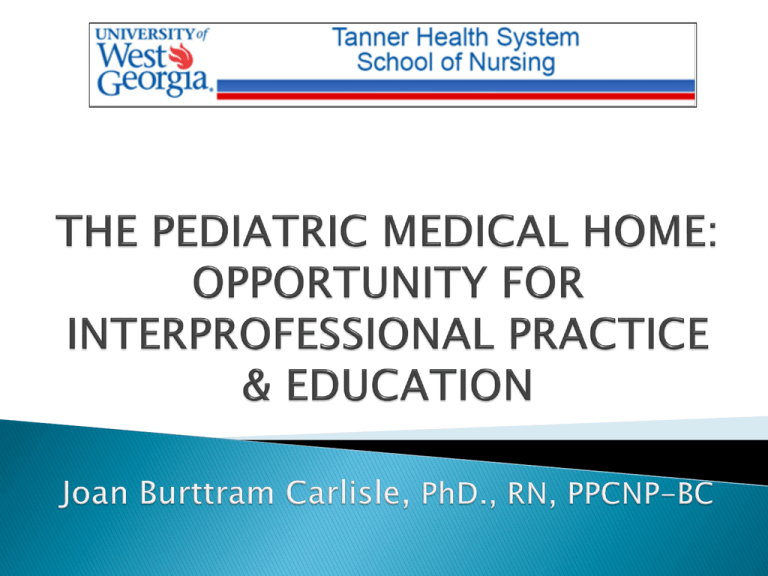
A primary care pediatric practice providing comprehensive care for children of all abilities, including well child care and sick appointments. Sparks Pediatrics strives to be a medical home for all children including those with special health care needs. Snehal Khatri, MD, FAAP ◦ Associate Professor of Pediatrics University of Alabama School of Medicine (board-certified developmental pediatrician) Jennifer Kimbrell, MSN, RN, CPNP ◦ Board-certified Pediatric Nurse Practitioner Maliea Box, RN Anola Ennis, MSN, RN, CPNP Joan Carlisle, PhD, RN, PPCNP-BC Velesha Heard, Office Associate (part-time) ◦ Board-certified Pediatric Nurse Practitioner (faculty practice) ◦ Board-certified Pediatric Nurse Practitioner Nutrition Dentistry Psychology (including Autism Evaluations, Social Skills Group for Teens with ASD, and Behavior Assessments) Multiple Disabilities Services Neurology: Rett Syndrome Clinic and Research Newborn Follow-Up for Very Premature Births Audiology including Augmentative/ Alternative Communication Psychoeducational Services (IQ testing and Special Ed) Speech/Language Optometry Occupational Therapy, and Constraint Therapy Social Work Newborn to 19 years of age Well baby/well child health care Physical and behavioral assessments according to American Academy of Pediatrics, Bright Futures, and Medicaid guidelines Many children have special health care needs Some children are considered to be medically fragile Large percentage of children are in foster care, or child protective service is involved Patients come from a variety of traditional and non-traditional family situations: Two parent home Single parent Foster placement Group homes Grandparents, great-grandparents, aunts, uncles, cousins, and friends/neighbors To serve as a medical home ◦ Assessments ◦ Management plans ◦ Anticipatory guidance ◦ Facilitate communication between family and providers (primary and specialists) ◦ Facilitate management plan/communication with schools, teachers (i.e. individual education plans) A continual challenge is to coordinate care and communication with our limited practice staff. All staff work collaboratively in managing patients. ◦ Morning team meeting to discuss patients for the day. ◦ No pre-scheduled provider (MD, PNP) unless a new consult is made with MD for behavior. ◦ Patient care conferences and consults held between providers during the course of the day. ◦ Consults with interprofessional colleagues, as needed. ◦ Referrals and consults made to outside providers within the healthcare community, as needed. Recognition in Birmingham Parent Magazine (as voted by parents) The “M” family Husband and wife accepted custody of their two GREAT grandsons. Tyler ◦ DX: Behavior issues, developmental delays, later diagnosed with ADHD Tanner ◦ DX: Congenital Cytomegalo Virus, hearing loss, delayed speech, behavior issues, developmental delays; later diagnosed with ADHD and aggression Shortly after we began seeing this family, a third great-grandson, Taylin, was born; they accepted this child into their care as well. ◦ All brothers would be together ◦ Maintain their family Behavior of older boys Behavior of youngest as he got older and learned to copy his older brothers Visitation after-effects when boys visited with birth mother Frequent visits to multidisciplinary specialists (i.e., hearing aids, behavior counseling, etc.) Retirement of both Mr. & Mrs. M Health challenges for both Mr. & Mrs. M Sparks served as medical home Assisting with referrals and needed services Acted as intermediary with psychology, audiology, speech, schools Flexible scheduling of primary care appointments and sick visits to better accommodate family needs and other appointments Able to ‘drop in’ for questions when in building for other services My husband and I have custody of our great grandsons; all are ADHD but the middle child has aggression as well. This has been quite a challenge to us. At times, the aggression is so severe we have to hold Tanner to keep him from hurting himself or others. Had I not had the support of Dr. Khatri and her staff, I would not have been able to handle this as I should. Sparks Clinic is much more than a Doctor’s office. They are a support for parents and grandparents with children with special needs. We also use the audiology department of Sparks for the middle grandson with hearing loss. He has been in hearing aids since 9 months old and we have had great support from Dr. Woodruff in getting Tanner the tools he needs in public school. She helped us get the FM system for him to use in all his classes. Dr. Khatri also referred us to a great psychologist and a psychiatrist to help manage the ADHD. I have told many people that Dr. Khatri and her staff are my lifeline. They have been there for us in the best of times… but most importantly, they have been there in the worst of times! “Elvis” is in the building (Halloween) Serves as a clinical site for: Nursing ◦ BSN programs ◦ MSN practitioner (PNP, FNP) Medicine ◦ Third year medical students ◦ Pediatric residents ◦ Pediatric fellows High School (shadow programs) Leadership Education in Neurodevelopmental and Related Disabilities (LEND) Program National training program funded through the Maternal and Child Health Bureau ◦ Idea for LEND began in the 1950s ◦ Currently there are 43 LENDS in 37 states ◦ Only LEND program that includes a pediatric primary care component Purpose: to improve the health of infants, children and adolescents with disabilities by advancing the knowledge and skills of all child health professionals. The curriculum is ◦ Organized around core competencies with ◦ Individualized training plans for each student Students are Master’s level or higher (1-2 year program) Audiology Dentistry Nursing Nutrition OT Psychology Speech-Language Pathology Social Work Clinical Rotations Sparks Pediatrics Multiple Disabilities Clinic Autism Evaluations Psychoeducational Evaluations Interdisciplinary Developmental Evaluations Home Observation of a Family of a Child with Special Needs Weekly Lectures Leadership and Advocacy Activities Interdisciplinary Patient-Specific Team Meetings Family Conferences Discipline-Specific Training Contact Information Joan Carlisle jcarlisl@westga.edu
